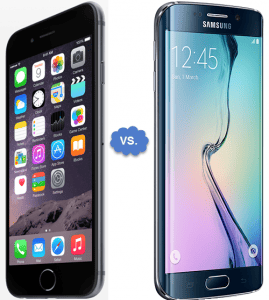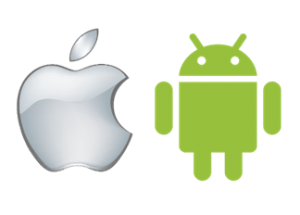Smartphones-What’s the Diff?
 Smartphones-What’s the Diff? a reader asks…
Smartphones-What’s the Diff? a reader asks…
please explain the differences between android and smartphones. thank you
Ok, let’s start with the generic term ‘smartphone’. A smartphone is simply a cell phone that includes some or most of the functions of a computer. So it can surf the web, use email, and run programs (called ‘apps’). Smartphones are made by many manufacturers, such as Apple, Samsung, HTC, Google, and Motorola. They usually have a touch-screen and very few physical buttons. A few might have a teeny-tiny physical keyboard, and one or two might have a stylus for tapping on the touchscreen. So ‘smartphone’ is a generic as calling a Kleenex a ’tissue’.
Each smartphone is powered by an operating system. The same as your computer. There are two primary types in use right now, iOS (made by Apple), and Android (made by Google). These could be compared to the Mac OS X operating system (OS), and the Microsoft Windows OS. Similar to these operating systems, the two smartphone OS’s have very different characteristics. For iOS, it is only on iPhones (and iPads and iPod Touch devices) made by Apple (same as Macs are only made by Apple). Android-powered smartphones come from dozens of companies and there are hundreds (thousands?) of models to choose from. These are more like Microsoft Windows, which comes on many different brands and models of personal computers (PC).
There are some other, niche brands and types of smartphones (such as Blackberry), but pretty much anyone you see with a smartphone is either going to own an iPhone, or one of dozens of popular brands and models of Android-powered smartphones. The actual differences between these can be very complicated, and highly subjective. Let me just give you a short description of the major differences:
-

Apple and Android logos iPhones and the iOS operating system that powers them are made only by Apple. So one company has near-complete control over pretty much everything that the phone does. You may want to call this a ‘walled garden’ in that Apple decides what you can and can’t do with your iPhone smartphone. This can be considered a good thing or a bad thing. The phone carriers (AT&T, Verizon, Sprint, etc.) have no say in how the system is configured to work for you. Third-party apps are available, but they must conform to strict rules from Apple in order for them to be available on the Apple-controlled App Store (the only place where you can get third-party apps). Apple also controls the versions of iOS that the iPhone uses, so most every iPhone is using the same version of iOS. Apple iPhones are considered ‘premium’ models and priced quite highly. iPhones are considered by most people to be very secure and reliable.
- By contrast, Android-powered smartphones come from many different manufacturers, and each manufacturer can customize the OS to fit their needs. Also, each carrier can add their own customizations to the operating system. The smartphones themselves are very differentiated in how they work, and are also very customizable by you, the user. Because the OS goes through so many hands, there’s a big problem with updates to the operating system never getting to most smartphone owners. Third party apps are available on the Google Play Store, and users can install just about any app from anywhere they’d like, with little control by Google. Even the ‘premium’ Android-powered smartphones are fighting it out price-wise, and most are quite low-cost (for the smartphone itself). Android-powered phones are considered by most people to be cheap, flexible, and reasonably secure and reliable.
- The cost of phone service and data plans for smartphones are generally independent of whether you have an iPhone or an Android-powered smartphone. In general the 2-year cost of owning a smartphone is only a small fraction of the up-front cost of the phone itself.
 The major appeal factors between the iPhone and Android-powered smartphones:
The major appeal factors between the iPhone and Android-powered smartphones:
- iPhones appeal to people who don’t want to futz with their smartphone and aren’t interested in customizing or changing things much. Great for busy people who don’t have time to spend on customizing but just want something that works easily and reliably. Best for people who are concerned about security – as the iPhone is considered the gold standard for smartphone security. No one has ever heard of an iPhone that has been hacked.
- Android-powered smartphones appeal to those looking to spend as little as possible on a smartphone, who like to customize their ‘user experience’ and who aren’t overly concerned with security.
I have posted other thoughts on this subject in my article Smartphone Switch?
This website runs on a patronage model. If you find my answers of value, please consider supporting me by sending any dollar amount via
 (send to @PosiTek),
(send to @PosiTek),  (send to Support@PosiTek.net),
(send to Support@PosiTek.net),  using any credit card (no Paypal account required), using Zelle, Apple Pay or Google Pay, or by mailing a check or cash to PosiTek.net LLC 1934 Old Gallows Road, Suite 350, Tysons Corner VA 22182.
I am not a non-profit, but your support helps me to continue delivering advice and consumer technology support to the public.
Thank you!
using any credit card (no Paypal account required), using Zelle, Apple Pay or Google Pay, or by mailing a check or cash to PosiTek.net LLC 1934 Old Gallows Road, Suite 350, Tysons Corner VA 22182.
I am not a non-profit, but your support helps me to continue delivering advice and consumer technology support to the public.
Thank you!






Thank you for your prompt, concise & helpful article on Smartphones.
This is a great article. I only wish I had it months ago when I was debating between an iPhone and Android!
Sorry I wasn’t quicker! So, which did you go for?